| |
|
|
| |
|
|
| |
 |
|
| |
|
|
| |
|
|
| |
|
|
| |
|
|
| |
 |
|
| |
|
|
| |
|
|
| |
|
|
| |
Jim Thornton again, going from great to verse. Not easy to write something like this life story in two paragraphs.
Allen Kirshner, Bill Schenley, EdV, Jazz Vulture and Mo get 20 points apiece.
* * *
When the USSR disintegrated in 1993 the Russians needed money fast, so they flogged off a Siberian state oil company called Yukos. But no one knew what it was worth — that was one reason the USSR disintegrated — and times were hard, so smart guys with access to credit made killings. Soon a fellow called Mikhail Khordokovsky owned most of the shares. Since Yukos was drilling about 2% of the world's oil, he became one of the world's richest men. But getting there had been messy. A couple of Yukos executives had been accused of killing the local mayor. One got convicted of murdering someone else. Khordokovsky needed a good lawyer, and he found Vassily Aleksanyan.
Soon Harvard graduate Aleksanyan was busy. According to his friends, disentangling Yukos's murky past and transforming it into a transparent modern company. According to his enemies, laundering Khordokovsky's ill-gotten gains. Whatever, he did well, until Khordokovsky fell out with Putin and Aleksanyan somehow got infected with HIV. The company was sent a multibillion-dollar unpaid tax bill. Khordokovsky was imprisoned, and the rest of the Yukos board quickly went into exile. For reasons unknown, Aleksanyan stuck around until, in 2006, he also was arrested. Allegedly the authorities withheld treatment for his HIV infection in an attempt to make him spill the beans. As his health declined, he became an international cause celebre with human rights activists, who eventually persuaded the Russians to release him on compassionate grounds. Too late. On Oct 3rd he died.
|
|
| |
|
|
| |
| |
An honest lawyer in bed with bad guys
Some found it paradoxical
But good-looking and dead of AIDS
Was the bed not metaphorical?
— Jim Thornton |
|
|
|
| |
|
|
| |
|
|
| |
|
|
| |
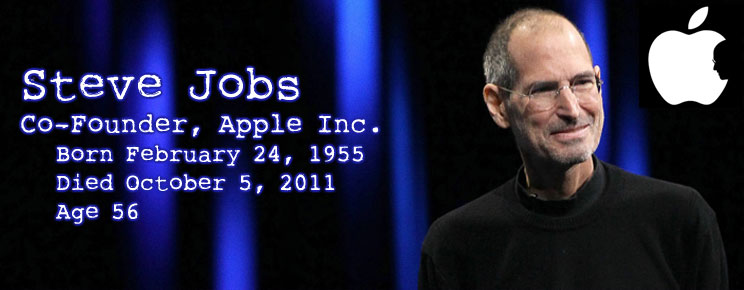 |
|
| |
|
|
| |
This was written by Matt Hubbard. I asked him to do it because he worked at Apple and Atari. Also, he's a great writer. And many of you know him. Thanks, Matt.
The cool people are Dannyb, Dead People Server, JTH, Mark and Monarc. 14 points each.
* * *
Get a cup of coffee and make yourself comfortable. This could take a while.
I'll wait.
Ready? Now we can begin.
The story of Steve Jobs starts as the story of The Two Steves, Jobs and Wozniak, with an episode of genius and betrayal.
Spoiler warning: Steve Jobs is not the genius.
Jobs' first big break is at fledgling Atari in 1975 at the age of 20, when he gets hired for $750 to do the chip design for Breakout, the sequel to Pong. It's designed for a single player with game play so similar to Pong there was no learning curve.
A game for lonely guys in pinball arcades with more quarters than sense, it was a license to print money.
The only hang-up was the production cost. 92 chips, way too many. Atari founder Nolan Bushnell cut a deal with Jobs to pay $100 for every chip that could be removed from the design of the working prototype. This is the Stone Age of computers, so the work isn't programming, it's computer architecture. This calls for a true alpha nerd, and Jobs calls in his friend Woz. He tightened up Jobs' design and removed fifty chips. When nerds speak of this, a reverential hush is invoked. Bushnell thought they might remove twenty or thirty and he would be happy with that.
Bushnell cut a check for a $5000 bonus and gave it to Jobs. Jobs told Woz about the original $750 and they would split it down the middle, so his share was $375. By the time Woz found out how his pal had screwed him, Jobs had taken his ill-gotten gains and flown to India.
Now consider this: When Jobs decided to make his own start-up called Apple, he recruited Woz immediately, and Woz said yes. There are two possible and non-contradictory explanations.
Theory #1: Woz was a glutton for punishment. Corroborating evidence for this theory is that Woz dated psycho bitch Kathy Griffin for a while.
Theory #2: Jobs could talk a cat off a fish cart. Corroborating evidence for this is the rest of his all-too-brief life.
I've read a lot of what people have written about Steve Jobs over the past few days, and there is a lot of respect and reverence, bordering on love. Apple gets people feeling that way for a lot of reasons, not least of which is the David vs. Goliath relationship with Microsoft, a corporation nobody loves, and with good cause.
But there's a difference between Li'l David and Steve. David starts off as a brave and innocent farm boy and turns into an incredibly devious son of a bitch. Jobs started out as an incredibly devious son of a bitch, but in the public's mind is something near to a secular saint or a modern-day Prometheus, giving the gifts of the gods to we poor mortals below.
I begin with this story to give us nerds our due and rail against the injustice of the world, but even as great a nerd god as Woz was — and he proved it again and again — Jobs, while a creep in many ways, was something just as rare.
He was a marketing genius.
No ironic quotes.
Jobs fit the American archetype of the beloved tyrant. He was the public face of a beloved corporation, almost an impossibility in this day and age. A lot of people writing fine noble prose about Jobs are also completely in agreement with the goals of the Occupy Wall Street movement.
The beloved tyrant of the past he most resembles is Walt Disney, but in many important details, they are as different as chalk and cheese. Here are a few.
Sorry, I didn't catch the name. Think for a moment about Walt Disney, as if Walt ever gave you a choice. Disney Studios, Disneyland, Disneyworld, EuroDisney, etc. His name is plastered on everything.
Jobs founded Apple, where the first products he is associated with are the Macintosh and the Lisa. When he leaves Apple, he calls his company NeXT. He buys the 3D animation department from LucasFilm and renames it Pixar. When he makes his great triumphal return to Apple and changes the company direction, everything is lowercase "i". iPad, iPod, iPhone, iMac, iWhatever. It's like he doesn't even want you to know he's the guy behind all this, though obviously he wants the cool people to know.
Fighting in the trenches, not blazing the trails. Disney makes a cartoon studio. Major studios create cartoon departments.
Disney makes the first feature-length cartoons. No one follows suit for decades.
Disney creates a huge, high-budget amusement park partly based on his cartoon characters. No one follows suit for decades.
Jobs' original company makes personal computers. He has a boatload of competitors, including Commodore and Atari at the beginning, and then big bad IBM. Not a problem. He makes the one with caché, the one that looks cool, the one with some feature the others don't have yet that he knows how to market. He didn't really invent the Mac. He didn't write MacPaint or MacWrite or develop the floppy disk in a hard plastic coat that looked like a prop on the original Star Trek. He was just the guy who signed off on everything. As a beloved tyrant, he made sure everything was just so. It's much the same story in the mp3 player market and the cell phone market. Something makes iPod and the iPhone cooler, some little gadget difference that the makes the public go "Wow!"
Only with Pixar does Jobs make a venture that very much resembled the trail-blazing Disney. He started the company that made feature-length 3D animation films. It took a while for others to follow suit successfully.
As not seen on TV. Walt Disney was on TV every week for most of my childhood. Titans of industry didn't do this back then, and it took nearly two decades for others to emulate him. By the 1970s, Colonel Sanders and Lee Iacocca followed suit, as did Orville Redenbacher and that jackass who liked Remington razors so much, he bought the company! (My lack of God, I hated those commercials.)
Steve Jobs didn't play that low-rent crap. He was the absolute star of MacWorld, but that was for the fans and the business community. He was almost the voiceover for the Think Different ads, but someone at Chiat/Day decided to go pro and hire Richard Dreyfuss to read the copy. Steve Jobs didn't leave in a huff. He probably made the right decision.
Actually, think about those horrible ads with Bill Gates and Jerry Seinfeld a few years back. You know, the ones where a millionaire and a billionaire are discussing the pros and cons of buying cheap shoes just before the entire world economy goes to absolute shit?
Not plastering his puss on TV may have been one of the best decisions Steve ever made.
Gadgets for gadgets' sake. Walt Disney sold nostalgia. Steve Jobs sold the future, and he sold it in a brand new way.
Gadgets are cool. We know that. As someone born in the same year as Steve Jobs, I grew up in the same basic environment. Gadgets were James Bond, gadgets were sold in Playboy with the underlying bullshit premise that buying the cool stereo system seen on page 87 dramatically increased your chances of fucking the girl seen buck naked on pages 90 through 98.
With the exception of the stunning tits on that girl with the hammer in the 1984 ad, Apple didn't use sex to sell their gadgets. Think Different was a terrific campaign, but not about sex. "I'm a Mac and I'm a PC" is about the funny, not the funny business.
Gadgets are cool because they are fun. They are cool because you can do things this week you couldn't do last week. They are cool because they look nice, because they are easy to use.
As for sex appeal, if you figure out how to use your gadget to talk to that cute girl on the train, hey, that's on you and more power to you.
Apple never made that promise.
Moving right along. It's not like everything Jobs touched turned to gold. The Lisa was too expensive. NeXT didn't do what it hoped to do. Jobs knew when to cut bait. One of the stories I've read since he died is a meeting between Jobs and Phil Knight of Nike in an elevator. Knight knew he was in the presence of genius, so he had to ask what the secret was.
"You make a lot of cool stuff. And you also make crap.
"Make less crap."
Steve Jobs is dead at the age of 56. I'll be 56 my next birthday, so it's obvious to me that is way too young. He won't be making any more cool stuff or crap, and it's a lack of God damned shame. Even a nerd like me knows how rare it is for a true marketing genius to come along.
— Matt Hubbard
|
|
| |
|
|
| |
 |
|
| |
|
|
| |
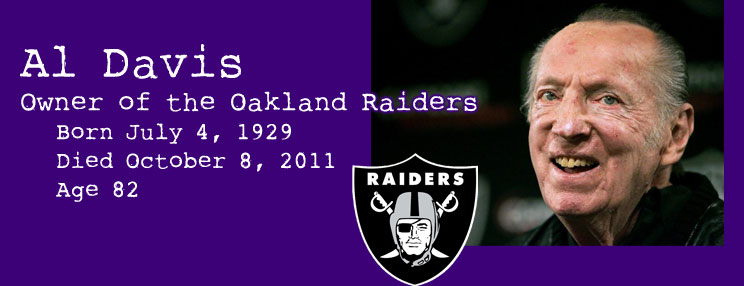 |
|
| |
|
|
| |
Bill writes the football updates for the same reason he writes the baseball ones: He's great.
* * *
Where I grew up in Pennsylvania, football loyalty was divided between the Steelers and the Browns; I was a Browns fan. Otto Graham, Frank Ryan, Ernie Green, Paul Warfield, Leroy Kelly, Lou Groza, Dick Modzelewski, Gary Collins and, of course, Jim Brown. Then, in 1965, the Oakland Raiders drafted a local kid, and like most other kids I knew, I became a Raiders fan. The local kid — I guess he washed out, because he ended up with the Montreal Alouettes, you know, like so many others who can't make it in the NFL. Al Davis was the coach of that 1965 Oakland Raiders football team.
Football and baseball. My two favorite sports. And my two favorite teams, the Raiders and the Yankees, had two of the greatest owners in their respective sports ... and two of the craziest.
During the 1980 off-season, Al Davis traded Kenny Stabler, the Snake, over a contract dispute [1]. In 1982, Davis drafted future Hall of Famer Marcus Allen, only to bench him for two years over another contract dispute. And he traded his coach, John Gruden, to Tampa Bay. Gruden led the Bucs to a Super Bowl win ... over the Raiders. But as bat-shit crazy as Davis was, the Raiders won three league championships, fifteen division championships, four conference championships, the 1967 AFL Championship, and three Super Bowls during the time he owned the Oakland/Los Angeles Raiders.
Whatever you might think about Al Davis, remember that his players loved him, when those who grew old before their time because of football, those who couldn't work or couldn't find work — Al Davis, without fanfare, took care of them. The Raiders have eleven players (who spent most of their career with the Raiders) and one coach in the Pro Football Hall of Fame; nine of them chose Al Davis to present them for induction [2]. No other owner can make that claim.
Grim McGraw and Loki each get five points for the hit and three bonus points. Total: 8.
— Bill Schenley
[1] In the end, the trade worked out well for the Raiders, but Davis took a lot of heat until Jim Plunkett led the Raiders to a Super Bowl win after routing Stabler's Houston Oilers team in the WC playoffs. [2] Lance Alworth, Jim Otto, George Blanda, Willie Brown, Gene Upshaw, Art Shell, Ted Hendricks, Fred Biletnikoff and John Madden, who coached the Raiders for ten years. |
|
| |
|
|
| |
 |
|
| |
|
|
| |
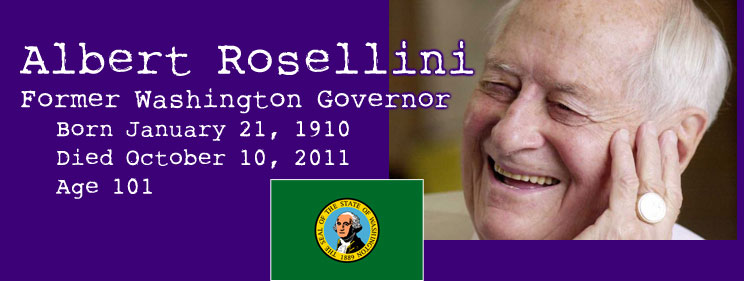 |
|
| |
|
|
| |
Ed Varner got the solo (6 points) and the writing assignment. Great job.
* * *
Whistle while you work
McGovern is a jerk
Rosellini bit his weenie
And now it doesn't work
This playground chant was my first memory of Washington Governor Albert Rosellini. It was the 1972 election, and the former governor lost an uphill battle trying to unseat a popular two-term Republican governor in the face of an impending Nixon landslide. Fortunately, this election loss would not define Rosellini, who had already left his mark on Washington state politics.
Albert Rosellini was born in Tacoma in 1910, the son of Italian immigrants. After his father was sent to prison for smuggling drugs, Rosellini was inspired to attend law school. He quickly parlayed the degree into a career in politics. He ran unsuccessfully for the state senate at age 24. Four years later he was elected, becoming at the time the youngest person in Washington state history to hold elective office.
Rising quickly in power, he became the Democratic senate leader three years later and remained in the state senate for 18 years. After losing his first bid to become governor in 1952, Rosellini was easily elected in 1956 and held the governorship for the next eight years. Rosellini was very popular during his first term and was known as a progressive and a New Deal Democrat. His tax increases led him to be given the name "Taxellini" by state Republicans. His achievements in office included getting the funding for the floating bridge which is named in his honor, helping bring the World's Fair to Seattle in 1962, reforming the state prison and mental health system, and helping to create the University of Washington Medical Center. His popularity waned and he was defeated by a landslide in his bid for a third term by Dan Evans in 1964. The aforementioned 1972 election was a rematch with Evans. The results of this election may have been different had the public known then about the campaign aide that worked close with Governor Evans. The aide was serial killer Ted Bundy.
After the '72 election, Rosellini retired from politics and served as the elder statesman of the state Democratic party. He resurfaced in the news in 2003 at the age of 91, when his name came up during a "strippergate" scandal that involved one of his old cronies. On March 18, 2011 he was in the news again when he became the oldest living state governor in the history of the U.S., surpassing Jimmie Davis of Louisiana.
Albert Rosellini died from complications of pneumonia three and a half months shy of his 102nd birthday.
— EdV
|
|
| |
|
|
| |
 |
|
| |
|
|
| |
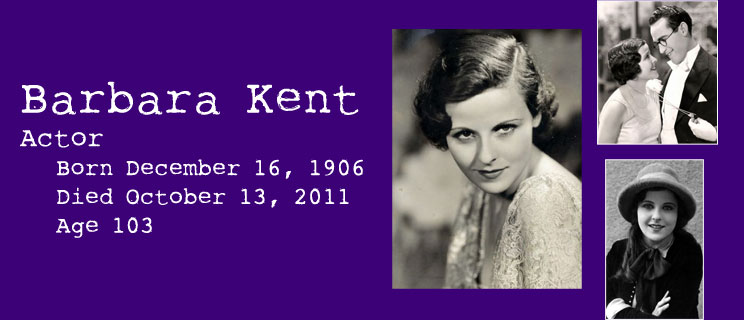 |
|
| |
|
|
| |
Barbara Kent was one of the last surviving stars of silent films. She was 103, so I'm wondering who would be left? I guess they would be children. I hope so. It's not a pretty visual, otherwise. Come to think of it, it's not a pretty visual any way you think about it.
After she won the 1925 Miss Hollywood beauty pageant, Barbara was cast in a 1926 western called Prowlers of the Night, the only woman in the cast. She followed that with Flesh and the Devil, in which she had a crush on John Gilbert. After that, it was a film with Oliver Hardy as the villain. Barbara swam in the nude in that one. After a few of these stinkers, she made the transition (apparently easily) to talkies. She appeared opposite Harold Lloyd in his first talking film, Welcome Danger. And then again with Lloyd in Feet First, about — you're not going to believe this — a shoe salesman trying to impress the boss' daughter, and it's a case of mistaken identity!
It should not come as a surprise to you to learn that after a few years of this, Barbara got bored, got married, got out of the business, got married again, got a pilot's license, and took up golf. She also lived about another hundred years.
She rarely consented to interviews, or even acknowledged that she ever had a film career. Which, from the sound of it, may have even been true.
Deceased Hose gets the hit. 6 points. 1 for advanced age. 5 for solo.
— Amelia
|
|
| |
|
|
| |
 |
|
| |
|
|
| |
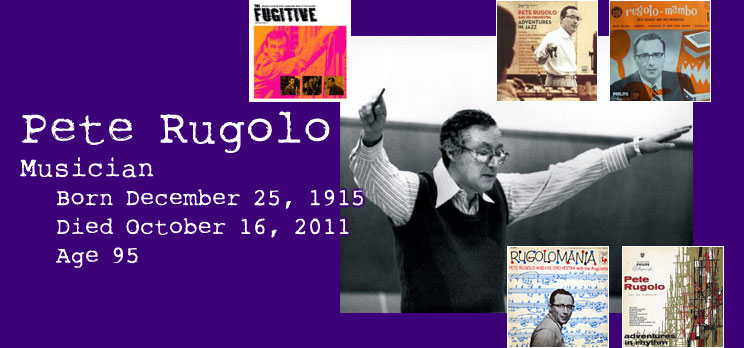 |
|
| |
|
|
| |
Arrangers are an underappreciated lot. Unless you're well-versed in the art of jazz-making, you probably don't even know what they do. What Pete Rugolo did for Stan Kenton was define the Kenton sound. Rugolo wrote more than a hundred arrangements for the big band, having handed Kenton a half-dozen of them while he was still in the Army leading the band at Fort Scott in San Francisco. Prior to that, Rugolo had studied with composer Darius Milhaud, so his pedigree was top-drawer.
After that, Rugolo became the music director of Capitol Records in New York. He produced Harry Belafonte's early hits (just saw a documentary about Belafonte, in which Rugolo is never mentioned once). He signed a Miles Davis group which played arrangements by Gil Evans, Gerry Mulligan and others. He got them in the studio for three days of sessions, producing the first wave of cool jazz in a dozen 78s that sold poorly. Rugolo made sure Capitol released all of them in 1957 on an LP called Birth of the Cool. If you know one thing about jazz, you know Birth of the Cool. It's pretty much the cornerstone of modern jazz.
Rugolo also made his mark in television, composing theme songs for shows that might be as well-known as they are because they had such cool theme songs. The Thin Man. Richard Diamond, Private Detective. The Fugitive. Run for Your Life. He wrote for episodes of Leave it to Beaver and M*A*S*H. (I love that the obits got the spelling right.)
And this is the part that I love the most about Pete Rugolo: In Where the Boys Are, one of my all-time favorite movies, there's an experimental combo led by Frank Gorshin, who calls their music "dialectic jazz." The compositions are by Pete Rugolo.
The hit is by Amelia. 1 plus 5 equals 6. You know me, I always have a jazz solo!
— Amelia
|
|
| |
|
|
| |
 |
|
| |
|
|
| |
 |
|
| |
|
|
| |
"So they've given up," the program began. "They're finally done in, and the rat is dead in an alley back of the Wilhelmstrasse. Take a bow, GI. Take a bow, little guy. The superman of tomorrow lies at the feet of you common men of this afternoon."
Often called the poet laureate of radio, Norman Corwin wrote the above for broadcast May 8, 1945, the days the Allies declared victory in Europe after the surrender of the Germans. The radio drama was called On a Note of Triumph, and it debuted coast to coast.
60 million Americans listened to the live broadcast read by Martin Gabel with music by Bernard Herrmann.
It was only one of many, many award-winning radio dramas Corwin wrote for CBS in the 1930s and 1940s. His touch was so elegant, he earned the reputation of being one of the few to credit radio audiences with intelligence.
Corwin's was definitely a class act.
He presented Paul Robeson singing Earl Robinson's cantata "Ballad for Americans," the first performance of Maxwell Anderson and Kurt Weill's "Ballad of Magna Carta," and an adaptation of Stephen Vincent Benet's poetry performed by Charles Laughton and Elsa Lanchester.
In 1945 Corwin directed The Undecided Molecule, his play about a molecule that wants to determine its own destiny and that argues its case in the Court of Physio-Chemical Relations, presided over by Groucho Marx. Also in the cast were Robert Benchley, Vincent Price, Sylvia Sidney and Keenan Wynn.
Then he was blacklisted and his only recourse was to stop writing for the radio intelligentsia and to start writing for Hollywood idiots. That was mostly dreck, but it paid the bills, and Corwin did eventually snag an Oscar nomination for Lust for Life.
Corwin did some more radio (because radio lives on and on) towards the end of his life and lived to the ripe old age of 101, which would be quite impressive if his father hadn't lived to 110.
Buford and Deepstblu get a swell duet. 4 points. 1 for the age, and three for the pair.
— Amelia
|
|
| |
|
|
| |
 |
|
| |
|
|
| |
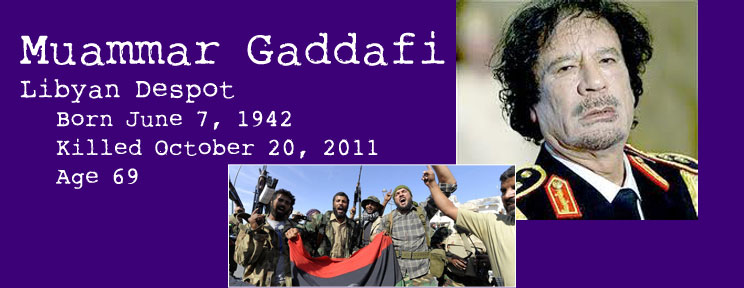 |
|
| |
|
|
| |
I could not have been happier to see that Jim Thornton had a hit with Gaddafi. Because then I knew that I would get a sublime update with a fantastic poem. Our lovely mascot, ???Guest, gets her first hit of the year with Gaddafi. Remember, she only has evil people on her list, and still it takes 'til October to get a hit. They get 14 points, 11 for age and three for the duet. At least, there's that. Enjoy.
* * *
Muammar Gaddafi, Brotherly Leader and
Guide of the Revolution of Libya
It's tough on the modern dictator. He gets the job because he's the most impulsive, dangerous and violent man in town, and keeps it by the well tried techniques of carrot, stick and bombast. He makes fiery speeches, bombs his enemies, and appropriates the oil to reward his friends and pay the secret police. For 40 years he rides crises out, gets the girls, and the oil keeps flowing, so no-one looks too closely at his torture chambers. In his funny hats and gold braid, surrounded by his buxom Amazonian Guard, he becomes almost lovable. Foreign leaders court him. And then one day a fruit seller in the next door country immolates himself and the people ask for free elections. Normally a few tanks would sort them out, but this time the West also gets involved. Soon NATO jets are shooting up his troops, and advisers are counselling a quick exit to Venezuela. It was good advice, but he'd always ignored that. Suddenly he finds himself dragged out of a drainpipe with a loaded gun to his head. It's tough on the modern dictator.
Things had started well. The handsome curly-haired colonel, who seized power from King Idris in a bloodless coup in 1969, talked a good game. Forcing up oil royalties annoyed the companies but made him popular at home. The money went into schools, hospital and water projects and, for a bit, health and literacy improved. But Gaddafi was just a poor kid from the desert; he didn't know how to run a country, so he was tempted by central planning. He called his policy "Islamic socialism" and wrote a Little Green Book about it — not a good sign. Soon the people were restless.
He would have fallen prey to the next strongman, but the oil price kept going up, and the sweetest crude poured out of every hole in the desert, so cheap the oilmen could afford his extortionate royalties and still make a tidy profit. All Gaddafi had to do was keep himself in the news as the permanent revolutionary. Any murderous nut-case could be sure of fraternal greetings from the Brotherly Leader.
Unfortunately the Leader rarely limited himself to fraternal greetings. He sent arms to the PLO, IRA, ETA, Red Brigades and many others. He fell out with half the Muslim world when his agents killed the Shia leader Musa al-Sadr, and he fell out with most of the rest when he went to war, albeit briefly, with his neighbours Egypt and Chad. Western leaders fretted over his efforts to get hold of chemical weapons and nuclear bombs. The general public was maddened when his diplomats walked free after one of them had shot police officer Yvonne Fletcher outside their London embassy. By the time his agents blew up La Belle nightclub in West Berlin and planted the bomb that bought down Pan Am flight 103 over Lockerbie in 1988, he had become an international pariah.
But his outrages had also made his name. Unlike the Tunisian fellow who wisely went into exile six months ago (what was his name?), Gaddafi was as famous as Idi Amin, Saddam Hussein and Pol Pot. Nevertheless, by the time of the 2003 Iraq invasion, even Gaddafi was feeling the heat. Fearing invasion, he admitted responsibility for Lockerbie and his other atrocities, and paid compensation. He even claimed to have given up his weapons of mass destruction. Tony Blair and other western leaders came to visit, and he was welcomed back into the international fold. He must have hoped to die in his bed, but it was not to be. The Arab Spring, Western jets and his own pigheadedness finally unseated him in the best way possible — a bullet in the head.
Amelia has been fretting about spelling his name in English. She was right to worry. A perfect storm of problems — Arabic letters without English equivalents, and changing phonetic transliteration conventions applied to idiosyncratic Libyan dialects, all muddled up with his refusal to speak English in public despite alleged fluency, and the occasional troublemaker who liked the ending "daffy" — have led to at least 57 variants. Here's a few, together with their advocates — Gaddafi (BBC and Al Jazeera), Gadhafi (CNN), Qaddafi (Library of Congress), al-Qadhafi (US State Dept), and el-Qaddafi (White House and New York Times).
But they're all wrong — someone found his son's passport in an abandoned palace last week. His family spell it Gathafi. And his first name? Let's not go there.
|
|
| |
|
|
| |
| |
The Colonel's coup was bloodless
Unusual for Gaddafi,
But lucky for King Idris,
Who had sold his oil so cheaply.
Paying for fresh water,
Bringing a bit of glamour,
— And not foreseeing the slaughter —
The people liked Muammar
But his Little Green Book was barmy,
Soon everyone thought he was gaga,
To be mates with Robert Mugabe
And Idi Amin Dada
Unlike his hats, he was not so smart.
He never seemed to wise up,
Making friends with Pol Pot,
Bombing a Berlin nightclub
His medals made a mockery
The people began to disaffect
When a plane blew up over Lockerbie
He was the first suspect.
Reagan and Thatcher got angry.
Even the Arabs got cranky.
Only the Russians stayed friendly
They needed the oil, see.
Surrounding himself with a buxom guard,
"Terrorists don't shoot women."
No-one believed a single word.
More likely he wanted to shag 'em
But after 9/11 things got hotter.
George Bush mocked his curly hair.
So he joined the War on Terror,
And made friends with Tony Blair
After lasting so long,
He must surely have wondered
If he'd prove us all wrong,
Die in bed at a hundred.
But fool to the last, he failed to heed,
The Arab Spring, advice to run,
So he ended at last, as he richly deserved
Dead in a ditch. Wrong end of a gun.
— Jim Thornton |
|
|
|
| |
|
|
| |
 |
|
| |
|
|
| |
 |
|
| |
|
|
| |
I wish Charlene wrote them all. She's sooooo good. Thank you, thank you, thank you.
* * *
The real problem with the senior members of the Saudi royal family isn't that they're secretive, or corrupt, or self-serving, or scheming, or cruel, or mercurial. They're all these things, of course, but the real problem is that they are all old as dirt. And that's deliberate.
You see, the Saudis aren't like most monarchies. In democratic monarchies like Sweden or the Commonwealth realms or even Japan, laws enacted by Parliament — in other words, by the people through their elected officials — set out exactly who succeeds when a sovereign resigns or dies. In Saudi Arabia, on the other hand, the power to decide who rules — and in Saudi Arabia, the King actually rules — is in the hands of the surviving sons of Ibn Saud's eighth wife, Princess Hassa bint Ahmad al-Sudairi. Known originally as the Sudairi Seven, they're behind almost everything that goes on in the Kingdom politically, religiously and economically. They're why the country is a senocracy — a country run by old farts — because it's their influence that has shut out the younger generation in favour of the creaking, aging sons of Ibn Saud.
Prince Sultan bin Abdul Aziz al-Saud was the second-oldest of the Sudairi Seven and the second to die (after his brother, the late King Fahd). His nickname (according to that vile scandal sheet The New York Times) was "Mr. Ten Percent," after the kickbacks he demanded from Western military contractors for equipment purchased by the Kingdom which now lies rusting at various Saudi military bases. When his brother Fahd died, the immensely wealthy Sultan was among those who supported half-brother Abdullah as the next King — as long as he was named heir to the throne. What a shock it must have been to him when all that power and all that money meant nothing in the face of metastatic colon cancer.
Prince Sultan was a spry 81 when he shuffled off this mortal coil — and the billions of dollars he stole from his country — on October 22. Another Lurker gets the solo, so that's 10 points total. Be glad I didn't keep one of those points for myself.
— Charlene
|
|
| |
|
|
| |
 |
|
| |
|
|
| |
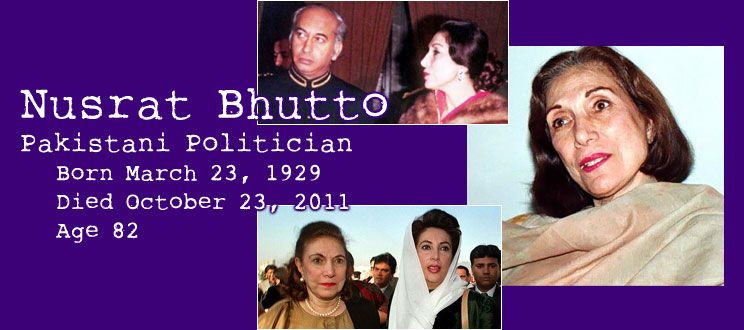 |
|
| |
|
|
| |
So Another Lurker sends me the news that he got a couple of obscure hits, and I kinda implied that if he knew what was good for him, he'd write one of them. I never heard from him, so I figured I had Nusrat Bhutto on my to-do list and, suddenly, it was in the in-box. How cool is that? He gets 6 points — 5 for age and one for the trio, since Gerard Tierney and Roxanne Wiggs joined him in the hit.
* * *
Here's one of these updates of a rather obscure person. A Pakistani politician who has rarely been heard from since 1995. Some writers here may have tried to make a funny update but, because I don't have the skills to do this, and Nusrat seems like an honorable character compared to most Pakistani politicians, I did some quick research to remind myself why I put her on my list.
Nusrat Bhutto was known as the Iron Lady of Pakistan. She was the matriarch of Pakistan's most well-known political family, and while she was actually most influential when her family was out of power, fighting for the lives of her husband and children who were persecuted by the military regimes in Pakistan, she was largely thought to have a lot of influence behind the scenes. Suffering from dementia for the past decade or more, she was mourned at her death, perhaps because many in Pakistan could relate to her life of almost unbearable tragedy. Born and raised in Iran, Nusrat married the politician Zulfikar Ali Bhutto, who served as prime minister of Pakistan during the 1970s. They had four children: Shahnawaz, Murtaza, Benazir and Sanim. Zulfikar was overthrown in a military coup in 1977 and executed in 1979. Nusrat was arrested repeatedly until 1982, when she was allowed to leave the country to receive cancer treatments. Her son Shahnawaz died under mysterious circumstances in 1985; many believe he was poisoned. Her daughter Benazir became prime minister in 1988, and Nusrat was an important adviser and Member of Parliament, but Nusrat was faced with a difficult situation when a power struggle between Benazir and Murtaza began. Nusrat took Murtaza's side. Murtaza was killed under controversial circumstances by the police in 1996. Shortly after the controversial death of her son Murtaza, Nusrat retired completely from politics, and Benazir lost power.
When Benazir was assassinated in 2007 after returning to Pakistan as another military regime ended, Nusrat was said to be so ill that she did not even hear about it. She was survived by only one child, her daughter Sanim. Asif Ali Zardari, Benazir's husband (whom Nusrat and others thought may have been behind Murtaza's death) is now the president, and their young son is the leader of the party. The roles of Nusrat and Murtaza were not discussed much around the time of Benazir's death, but Nusrat's death gained much attention in Pakistan and internationally.
Nusrat is well known for keeping the family's political party, the Pakistan People's Party, alive during difficult times. She is known as the Mother of Democracy, and is believed by supporters to have been a major advocate for women's rights.
— Another Lurker
|
|
| |
|
|
| |
|
|
|

